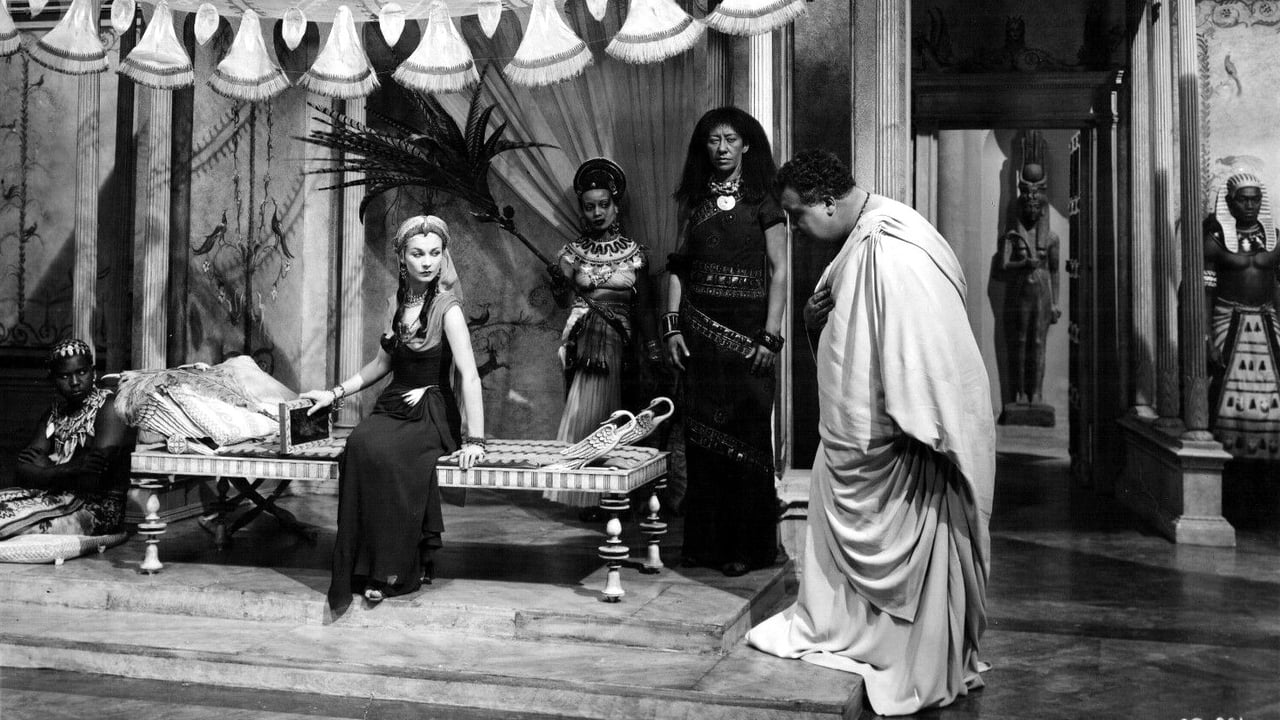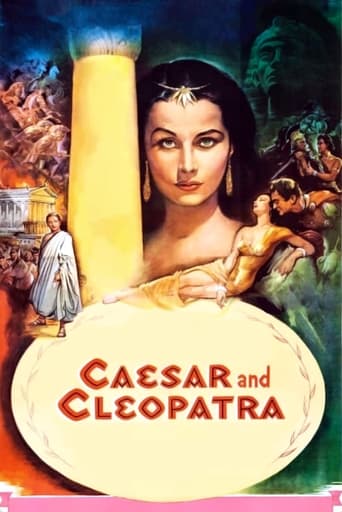



Who payed the critics
I gave this film a 9 out of 10, because it was exactly what I expected it to be.
View MoreAlthough I seem to have had higher expectations than I thought, the movie is super entertaining.
View MoreTrue to its essence, the characters remain on the same line and manage to entertain the viewer, each highlighting their own distinctive qualities or touches.
View MoreEven the presence of two great performers cannot save CAESAR AND CLEOPATRA from sheer boredom. The fault, of course, lies in the George Bernard Shaw play on which the film is based. The early scenes involving LEO GENN and the scene showing CLAUDE RAINS' first encounter with Cleopatra are so badly staged, written and directed that a viewer like myself cannot even get involved in caring about the characters.VIVIEN LEIGH prances around like an airhead girl without any sense of decorum or wisdom, making her an unlikely candidate to become Queen of the Nile. Furthermore, her illness shows in every close-up and the eye make-up and white skin is hardly how one visualizes the woman who would later seduce Mark Antony.CLAUDE RAINS is an impressive Caesar, but his fawning over the childish woman he first encounters (on a sound stage in a fake desert) becomes intolerable after awhile. Vivien seems like a spoiled brat undeserving the sort of attention reaped on her.But the biggest distraction is that it is obvious all of the outdoor scenes are taking place on studio sets, given that the film was made when Britain was still being bombarded with air attacks during WWII. The color print shown on TCM is a bit garish but does indicate that a lot of expense went into costumes and settings. Too bad all this money couldn't have been lavished on a better script. As Shaw, who penned the script, has Liza say in "My Fair Lady,": "I get words, words, words!"FLORA ROBSON is a bit hard to take in an offbeat role and most of the supporting names in the large cast are wasted, with the exception of STEWART GRANGER.Summing up: Not cinematic. Never overcomes its stage origins.
View MoreYou're liable to get the impression from the first couple of scenes that this is stagy and maybe without too much point. Claude Raines as the newly arrived conqueror meets Vivien Leigh as the air-headed tittering adolescent Cleopatra in front of the Sphinx and under the Egyptian stars. It's all very cute.Well, it remains stagy. After all, it's a play. But it's hardly pointless. Raines remains the man he first appears, rather gentle, bearing the weight of the world on his shoulders, good-natured, able to suffer some twitting, stern but fair, endearingly sensitive about being middle aged and losing his hair.But Cleopatra -- wow! When she meets Raines, Vivien Leigh is wraith like and pale and imperiously beautiful without actually knowing it. At first, she's just a kid, jealous of her husband, who is her younger brother, who rules Egypt as Ptolemy -- or at least he did, until Raines takes the reins. But Leigh's character evolves. Her childishness, her giggling and choking on tears, is at first an aspect of her inner nature but later becomes a tactical ploy used deliberately in disarming enemies. She turns pretty clever, and not in a good way. Her whimsy turns to murder. She enchants Raines, but Raines is no fool. He treats her like a slightly reckless daughter until, after she has a rival assassinated, he dresses her down. But in the end he sails away, leaving her in the hands of his Executive Officer, and promising to send her a handsome younger man named Marc Antony.Aside from "Pygmalion," I was never able to get WITH George Bernard Shaw, whose play this is. The two or three of his plays that I've seen seemed preachy and discursive. But if you get past the opening, this one is pretty good. Of course, Shaw being the rational moralist he was, it's about more than Caesar and Cleopatra and who's going to rule Egypt.Cecil Parker is Caesar's worried slave and first-hand man, Brittanus, "an Islander," meaning he's from Britain and worships the Druids or something. Shaw has a good time with him, poking fun at his homeland. Well, I guess Shaw was Irish, but identified more with Britain. Parker's Brit is a mostly comic figure who can't swim. He's aghast when he is asked to leave Cleopatra with a man, unattended by a chaperon. "Shocked!", he exclaims, in a tone copyrighted by Claude Raines a few years earlier in "Casablanca." But then, later, someone asks Raines, "What, is Caesar in despair?" And Raines replies, "He who has never hoped cannot despair," which either Albert Camus ripped off from Shaw, or independently invented. Kids -- don't try to apply that maxim at home. I did, and it doesn't work.What a cast! Almost everybody who was anybody is in this thing in parts small or large. Stewart Granger is present as the tall, dark, handsome, Sicilian Apollodorus. He's the only person in the film with an evident sun tan and wardrobe has him decked out in embarrassingly brief garments. Stanley Holloway goes almost unnoticed as a Roman soldier with, I think, one line. (He was a sublime grave digger two years later in Olivier's "Hamlet.") Too many other familiar names to list, though I should mention that I think I glimpsed a chubby teen-aged Jean Simmons as a harp player who had no lines at all. If her movie career had stopped at this point, mine would have been better than hers. I had a dozen parts with no lines at all.All of those performances, by the way, are quite good, even if they seem a little hammy at times, as if this were a filmed play and the actors were trying for the balcony. The sets are both stylized and stylish.And it's both amusing and dramatic without being in the least preachy.
View MoreWith Claude Rains and Vivien Leigh taking the leads in this George Bernard Shaw play, and a supporting cast made up of Flora Robson, Stewart Granger and Frances L "Did I do right, Pip?" Sullivan from Great Expectations, it would be a crazy film buff who didn't make this a priority viewing, right? Er - wrong.The whole thing feels very stagey and the direction never gains any momentum. It's hard to believe that this comes from the same era as Casablanca or Great Expectations, it just feels so twee, almost like a secondary school play. I like Rains but prefer him in his sly, side-on roles rather than benign and heroic as Caesar here. Vivien Leigh is a pouty, annoying Cleopatra, very much like Jean Simmons as young Estella (okay, that came a year after so I guess Simmons is the copy cat). All you wish for her is that Caeser would put her on the receiving end of a dozen rough Roman soldiers! Otherwise this is all fodder for the Carry On and Monty Python brigade. There's even a young Robert Morley lisping the name of Caeser, and an old dodderer who is a dead ringer for the geezer who helps hide the People's Front of Judea from the Romans in Life of Brian. Look out for John 'We're doooomed!' Laurie as a centurian at two minutes past the first hour. Looking old even then.Things do pick up a bit towards the end, with ruminations on power and mortality, but until then it seemed a bit shallow. Just because the Liz Taylor Cleopatra is a bit of a turkey doesn't mean this is much cop.
View MoreObserve Claude Rains' soliloquy at the Sphinx near the beginning of this film. His amazing voice and graceful delivery of the words prove once again why he is increasingly becoming more respected as one of the major actors of the 20th Century. Just watch and you will see that I am not exaggerating. Rains' outstanding performance is the chief reason that this film holds together and deserves your viewing time.Vivien Leigh is not Scarlett O'Hara here. I don't mean that in a negative way, its just that her life and career are in transition at this point. She is more mature, and her voice is obviously affected by cigarettes or by the tuberculosis that she was suffering from that year, and she appears pale and fragile at times. I mention this because it is significant, as she is forced to try to bring some of her once-youthful "Scarlett" and "Lady Hamilton" girlish liveliness to the early scenes but only barely succeeds. Later, through sheer acting ability she admirably begins to project a regal presence as the film progresses. Maybe not the best Cleopatra on film, but overall she is certainly more than adequate.The supporting cast is excellent although they are sometimes directed rather sloppily, as though maybe the production was rushed. The overall production seems odd to me because it is done as if it is simply the stage play on film, taking place mostly in a palace at Alexandria. Also, some heavy themes are played lightly or even frivolously at times. I am a bit puzzled about what style they were going for.Having seen this film several times I am always impressed by George Auric's theme music and scoring, but always the poor sound recording almost spoils its effect. Hopefully someday a reconstructed score or maybe a restoration or enhancement of this original soundtrack will be presented with the film.You must admire the obvious hard work and effort that Rains and Leigh contributed to this movie. Overall, if you view this movie primarily for Claude Rains' performance but don't expect a lot more out of it you won't be disappointed.
View More